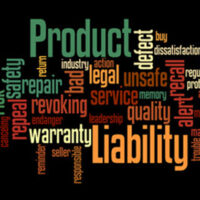Product Liability for Businesses 101

Product liability is a major concern for many businesses: for good reason. Product liability suits are common in the U.S. and every responsible business owner owes it to themselves to have a general awareness of their responsibilities in providing products to customers, and where potential for these suits may lie.
This article will go over some of the basic tenets of product liability. For official advice and help in your own business litigation and/or product liability suit, contact an experienced product liability and business litigation attorney at the Forsythe Law Firm.
Theories of Product Liability
A successful product liability suit will primarily follow one of three paths, or theories of liability. These theories are
- Strict liability
- Breach of Warranty
- Negligence
Strict Liability
Strict Liability applies to the sale or lease of any product which, if defective, may be expected to cause physical harm to the consumer or user. Suits brought under this theory seek to make manufacturers and sellers liable for injuries caused by defective products, regardless of whether the manufacturer or seller was negligent. In this theory – defect + harm = liability. It does not matter if you did due diligence: the product was defective and caused harm. The focus is on the defect of the product, not the conduct of the seller/manufacturer. This is the strict liability standard.
To succeed under this theory, a plaintiff must be able to prove that the product was defective, the defect existed when the product left the manufacturer’s control, and that this defect then caused the injury at issue.
There are generally three types of product defects; manufacturing defects, design defects, and marketing defects, which can be further elaborated on by contacting the Forsythe Law Firm.
Breach of Warranty
People can also bring a products liability suit claiming breach of warranty. This theory arises from allegations that the product’s quality or performance violated either an “express” or “implied” warranty.
- Express warranties: specific promises or representations made by the seller about the product.
- Implied warranties: Guarantees that the product is fit for its ordinary purpose and is of merchantable quality (good enough to sell as that product.)
In Georgia, there are limitations on who can sue under implied warranty, and claims that can be made under this theory. Contact an experienced products liability attorney to receive more specific advice tailored to your own circumstances.
Negligence
Suits under a negligence theory will focus on allegations that the seller failed to exercise reasonable care in designing, manufacturing, or selling a product.
To succeed in a suit claiming negligence, the plaintiff must demonstrate that the manufacturer or seller breached a duty of care, and this breach directly caused the injury at issue.
Negligence claims and strict liability claims differ in the aspect that to prove that negligence occurred you must show that someone acted unreasonably. In strict liability suits, the behavior of the party is not in question: it is strictly about whether the product was defective or not, and if that defect led to injury.
Contact the Forsythe Law Firm
An experienced Atlanta business litigation and products liability attorney can help businesses navigate any legal questions that might arise in the course of business. Contact our firm today to speak with an expert about your own case.
Sources:
ajc.com/news/atlanta-news/justices-struggle-with-awkward-georgia-law-in-hair-relaxer-cases/X3GP66KQ7ZCATLVO2WKEMKYL6E/
transportationtodaynews.com/news/35539-georgia-judge-dismantles-most-of-deltas-500m-lawsuit-against-crowdstrike/
